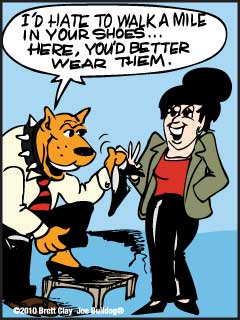Change Leadership — Secret # 70
The Customer Owns the Mine
There are risks and costs to a program of action,
but they are far less than the long-range risks and
costs of comfortable inaction. —John F. Kennedy
What I Need to Know |
You can do great things for people, but if they do not appreciate them, what have you accomplished? More important, if you have created huge value for your customer, but he does not recognize or appreciate it, your compensation will be commensurate with the value your customer perceives, not the value you created.
When we are in the role of helping people, sometimes we want so much to help them that we take ownership for their situation ourselves. If you have parents or children, you know how frustrating it can be when they fail to follow your well-informed suggestion. It’s like leading a horse to water. You feel like saying, “If you don’t drink the water in the trough, you’re going to die. Look, if you don’t drink it, I’m going to drink it for you!”
Just as in our roles as parents or children we cannot drink the water for the people we are trying to help, as salespeople and change leaders, we cannot make the change for our customers.
From time to time, when we are deeply involved with an account—we are deep in the proverbial mine shaft, if you will—it consumes our life and we forget who owns the mine. Ultimately, the mountain you are mining is owned by the customer.
The value you find in the mine is the value the customer perceives, not the value you perceive. Also, it is the customer who creates the value. You are merely the customer’s helper.
What I Need to Do |
Go ahead and be passionate. Go ahead and passionately care about helping your customers. If you do not sincerely derive satisfaction from helping your customers, you will not be a successful change-centric salesperson.
Go ahead and imagine yourself in the customer’s shoes. Imagine the forces the customer is feeling and how the customer can best respond to them.
But, stop short of believing you are actually living in the customer’s shoes. Stop short of believing the shoes are yours.
Experienced teachers set clear boundaries for their ownership because they know some “horses” will drink from the trough and some will not, regardless of the teacher’s actions and best intentions. Set similar boundaries for your ownership.
Make sure the customer personally takes ownership, every step along the way, for the value you help create.
Action Summary |
|
 |



Social